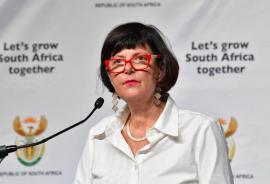
Forestry, Fisheries and the Environment Minister, Barbara Creecy, has called on leaders on the continent to urgently implement measures to improve the resilience of Africa’s infrastructure investments against the impacts of climate change.
“If the impacts of climate change are not taken into account now, there is a considerable risk that the current, and potentially the next generation of infrastructure in Africa will be locked into designs that could be inadequate for the future climate and costly or impossible to modify later,” Creecy said in Nairobi, Kenya.
Addressing the Africa Climate Summit on Monday, Creecy said climate change impacts will be genuinely felt during the life span of the planned and future infrastructure within the coming decade.
“Planning new infrastructure for climate resilience and adapting existing infrastructure to reduce risks should be a priority as there is a high probability that climate change will offset or reduce the economic and developmental benefits of these investments.”
Creecy noted the continued decline in the delivery of public climate finance in real terms for developing nations.
“Developed countries have not met the US$ 100 billion per year mobilization goal by 2020 and have indicated that this goal may potentially be met later this year (2023). The goal of doubling adaptation finance from 2019 levels by 2025 is an undertaking in paper only.
“With an estimated annual infrastructure financing requirement in the range from US$130 - 170 billion according to the African Development Bank, implementing urgent measures to improve the resilience of Africa’s infrastructure investments must become the main occupation for us as decision-makers,” the Minister said.
The Global Commission on Adaptation estimates that climate change will lead to an equivalent of 2% to 4% annual loss in gross domestic product (GDP) on the continent by 2040.
The Stern/Songwe High Level Expert Report, commissioned by the COP27 President, found that while “estimates for future loss and damage are subject to great uncertainty, but recent events suggest they could be as high as US$150–300 billion by 2030 to cope with immediate impacts and for subsequent reconstruction.”
“Various other reports demonstrate the enormous climate change needs of developing countries and how present public climate finance flows are unforthcoming, inadequate and lack in quality. In addition, the current financial architecture features an unfortunate reality where developing countries, those that have least contributed to the climate problem, continue to shoulder climate costs albeit their very limited fiscal space and constrained economies,” the Minister said.
Financing
She said African countries need a new suite of financing instruments, with a set of favourable terms and conditions that are not merely debt generators.
“Local currency lending is an imperative to support climate action in Africa. In this regard, recent efforts by the Green Climate Fund and the New Development Bank offer rays of hope. We need to urgently address the need for liquidity in fiscally constrained African countries.
“We further need to address the form of the finance available to developing countries and, in particular, put in place measures that climate finance does not lead to the increased debt burden of African and other developing countries. Credit enhancement approaches are readily available to the private sector, but the urgent reforms are needed in the public sector.
“We need access to scaled-up new and additional and predictable grant and highly concessional finance, which could be deployed effectively to create enabling environments by beginning to buy down risks and create new asset classes for clean investments that would allow for greater mobilization and leveraging of public and private finance and hence access the illusive and unseen trillions,” the Minister said. –SAnews.gov.za


